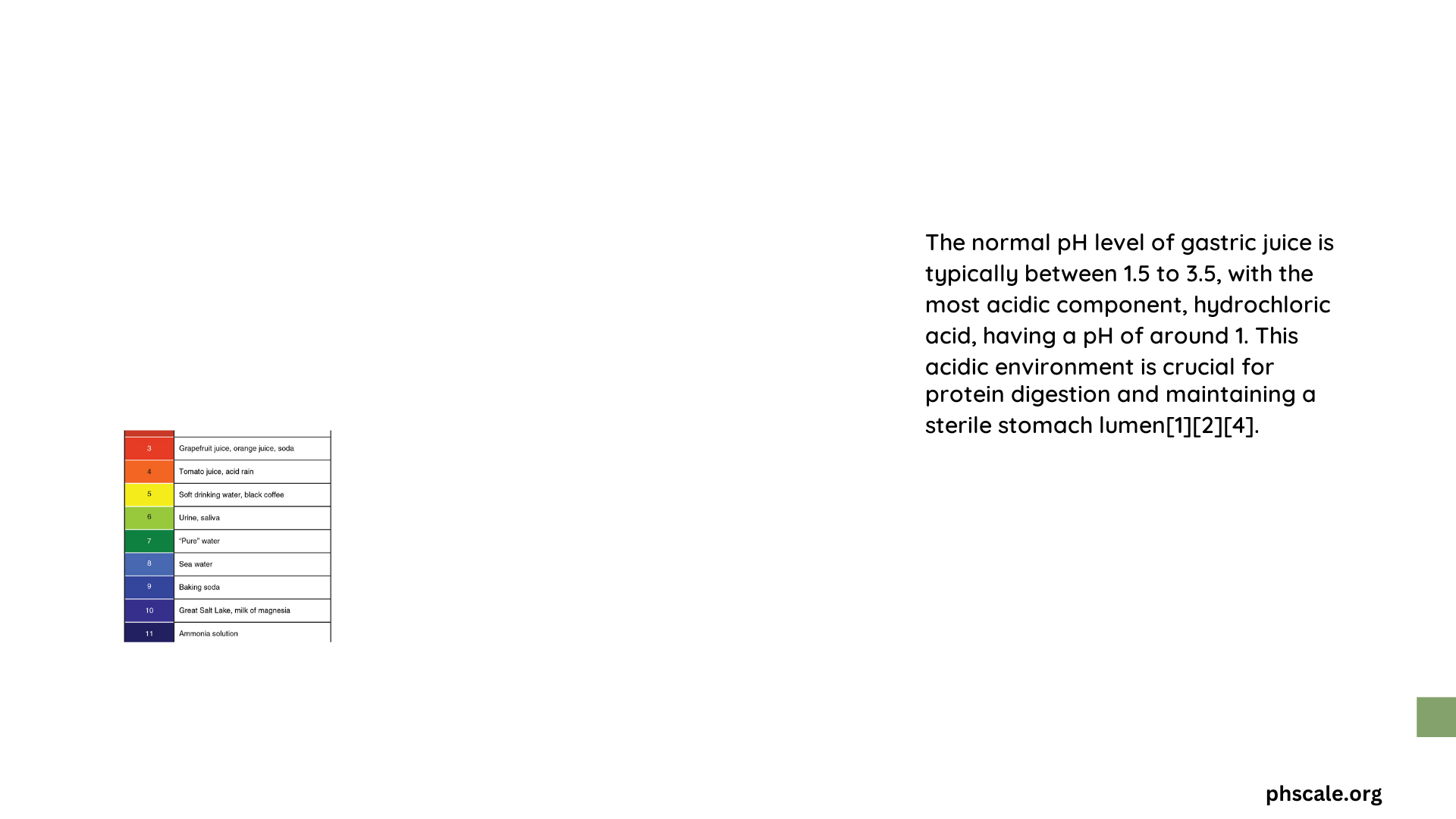The normal gastric juice pH level typically ranges from 1.5 to 3.5, making it highly acidic. This acidity is crucial for proper digestion, enzyme activation, and protection against pathogens. Gastric juice pH can vary based on factors such as fasting state, meal consumption, and certain health conditions. Understanding normal gastric juice pH levels is essential for diagnosing and managing various gastrointestinal disorders.
What is the Normal pH Range of Gastric Juice?
The normal pH range of gastric juice is between 1.5 and 3.5. This highly acidic environment is maintained by the secretion of hydrochloric acid (HCl) from parietal cells in the stomach lining. The pH level can fluctuate within this range depending on various factors:
- Fasting state: pH tends to be slightly higher but still acidic
- After meals: pH may temporarily rise due to food buffering effects
- Health conditions: certain disorders can affect acid production
- Medications: some drugs can alter gastric acid secretion
It’s important to note that while the normal range is 1.5-3.5, the optimal pH for pepsin (the main digestive enzyme in the stomach) activity is between 1.5 and 2.5.
Why is the Acidic pH of Gastric Juice Important?

The acidic nature of gastric juice serves several crucial functions in the digestive process:
- Enzyme activation: Activates pepsinogen to pepsin for protein digestion
- Protein denaturation: Helps break down protein structures for easier digestion
- Pathogen defense: Inhibits growth of many harmful microorganisms
- Nutrient absorption: Aids in the absorption of certain nutrients like iron and vitamin B12
- Gastric emptying regulation: Influences the rate at which food leaves the stomach
How Does Gastric Juice pH Affect Digestion?
The pH level of gastric juice plays a vital role in the digestive process:
| pH Range | Effect on Digestion |
|---|---|
| 1.5-2.5 | Optimal for pepsin activity |
| 3.0-3.5 | Reduced pepsin activity, but still acidic enough for some digestion |
| >4.0 | Significantly reduced pepsin activity, potential for bacterial overgrowth |
As food enters the stomach, it temporarily raises the pH. However, this triggers increased acid secretion to bring the pH back down to the optimal range for digestion.
What Factors Influence Gastric Acid Secretion?
Several mechanisms and factors influence gastric acid secretion:
- Hormonal factors:
- Gastrin: Stimulates HCl secretion from parietal cells
- Histamine: Released by enterochromaffin-like cells, enhances acid secretion
-
Somatostatin: Inhibits acid secretion
-
Neural factors:
- Vagus nerve: Releases acetylcholine, stimulating acid secretion
-
Sympathetic nervous system: Can inhibit acid secretion during stress
-
Other factors:
- Meal composition: Protein-rich meals stimulate more acid secretion
- Caffeine and alcohol: Can increase acid production
- Stress: May alter acid secretion patterns
How is Gastric Juice pH Measured?
Accurate measurement of gastric juice pH is crucial for diagnosing and managing gastrointestinal disorders. Common methods include:
- pH Meters:
- Most accurate method
- Used in conjunction with gastric acid secretion tests
-
Involves inserting a tube into the stomach to aspirate fluid
-
Indicator Solutions:
- Less precise but quicker
- Used for qualitative assessments
-
Color changes indicate approximate pH levels
-
Wireless pH Capsules:
- Modern, less invasive method
- Patient swallows a capsule that transmits pH data
- Provides continuous monitoring over 24-48 hours
What Conditions Can Affect Gastric Juice pH?
Several conditions can lead to abnormal gastric juice pH levels:
- Hypochlorhydria: Insufficient acid production (pH > 3.5)
- Causes: Atrophic gastritis, H. pylori infection, certain medications
-
Symptoms: Digestive discomfort, nutrient deficiencies
-
Hyperchlorhydria: Excessive acid production (pH < 1.5)
- Causes: Zollinger-Ellison syndrome, stress, certain medications
-
Symptoms: Heartburn, peptic ulcers
-
Achlorhydria: Complete lack of stomach acid (pH > 7.0)
- Causes: Autoimmune gastritis, long-term use of proton pump inhibitors
- Symptoms: Increased risk of infections, malabsorption
How Can Gastric Juice pH Be Regulated?
Maintaining a healthy gastric juice pH is essential for optimal digestion and overall health. Here are some ways to regulate gastric juice pH:
- Dietary modifications:
- Avoid trigger foods that increase acid production
- Consume smaller, more frequent meals
-
Chew food thoroughly to aid digestion
-
Lifestyle changes:
- Manage stress through relaxation techniques
- Avoid lying down immediately after meals
-
Maintain a healthy weight
-
Medications (under medical supervision):
- Antacids: Neutralize stomach acid
- H2 blockers: Reduce acid production
-
Proton pump inhibitors: Decrease acid secretion
-
Natural remedies:
- Ginger: May help reduce stomach acid
- Aloe vera: Can have a soothing effect on the stomach lining
- Probiotics: May help balance stomach acidity
It’s important to consult a healthcare professional before making significant changes to manage gastric juice pH, especially if experiencing persistent symptoms or diagnosed with a gastrointestinal condition.
Understanding the normal gastric juice pH level and its importance in digestion can help individuals make informed decisions about their digestive health and seek appropriate medical attention when necessary.
References:
1. Wikipedia – Gastric Acid
2. Healthline – All About pH for Stomach Acid
3. UCSF Health – Stomach Acid Test
